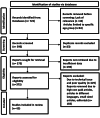Neuropsychiatric Manifestations of Thyroid Diseases
- PMID: 36811059
- PMCID: PMC9938951
- DOI: 10.7759/cureus.33987
Neuropsychiatric Manifestations of Thyroid Diseases
Abstract
Thyroid disorders are known to cause neuropsychiatric manifestations. Various neuropsychiatric manifestations are depression, dementia, mania, and autoimmune Hashimoto encephalopathy. Numerous investigations carried out in the previous 50-60 years have been evaluated critically. The pathophysiology of neuropsychiatric symptoms of thyroid diseases is described in the current study and its link with autoimmune Hashimoto encephalopathy is also discussed. Furthermore, this paper also describes the association between thyroid-stimulating hormones and cognitive impairment. Hypothyroidism is associated with depression and mania, and hyperthyroidism is linked with dementia and mania. The association between Graves' disease and various mental disorders such as depressive and anxiety disorders is also discussed. The aim of this study is to review the relationship between various neuropsychiatric disorders and thyroid diseases. A literature search from the PubMed database to find various neuropsychiatric manifestations of thyroid disorders in the adult population was conducted. According to the review of the studies, cognitive impairment can result from thyroid disease. It has not been possible to demonstrate how hyperthyroidism can hasten the process of developing dementia. However, subclinical hyperthyroidism, thyroid-stimulating hormone (TSH) levels below the normal range, and high free thyroxine (T4) levels all raise the risk of dementia in the elderly. Additionally, the potential mechanisms underlying this association have been examined. A quick summary of the research on mania as a clinical symptom of hypothyroidism and its likely causes and pathogenesis is also reviewed. There is no dearth of evidence that describes various neuropsychiatric manifestation in thyroid disorders.
Keywords: autoimmune hashimoto encephalopathy; cognitive impairment; dementia; depression; hyperthyroidism; hypothyroidism; mania; mental disorders; thyroid; thyroid dysfunction.
Copyright © 2023, Lekurwale et al.
Conflict of interest statement
The authors have declared that no competing interests exist.
Figures
References
-
- Thyroid hormone regulated genes in cerebral cortex development. Bernal J. J Endocrinol. 2017;232:0–97. - PubMed
-
- Thyroid hormones, the brain, and affective disorders. Joffe RT, Sokolov ST. https://pubmed.ncbi.nlm.nih.gov/8124730/ Crit Rev Neurobiol. 1994;8:45–63. - PubMed
-
- The thyroid-brain interaction in thyroid disorders and mood disorders. Bauer M, Goetz T, Glenn T, Whybrow PC. J Neuroendocrinol. 2008;20:1101–1114. - PubMed
-
- Thyroid-stimulating hormone and mild cognitive impairment: results of the Heinz Nixdorf Recall study. Winkler A, Weimar C, Jöckel KH, et al. J Alzheimers Dis. 2016;49:797–807. - PubMed
Publication types
LinkOut - more resources
Full Text Sources
Medical

